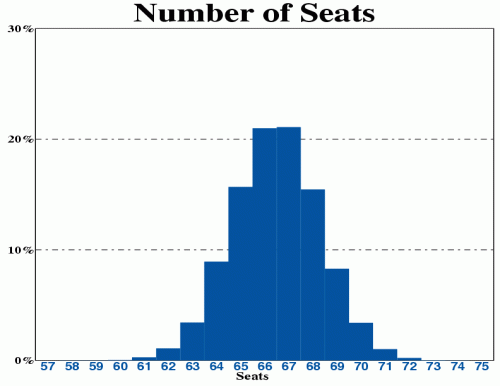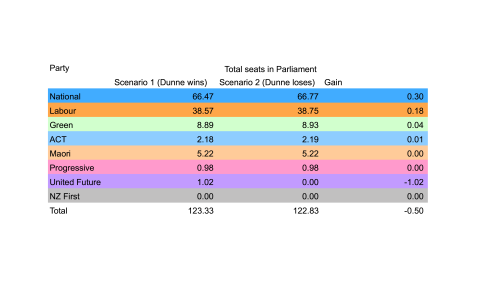A few days ago Jeanette Fitzsimons announced her retirement from Parliament, effective February 11th 2009. Ms Fitzsimons will be replaced by Gareth Hughes, who was ranked #11 on the Green Party List for the 2008 NZ General Election.
The implications of this move for the other major and minor NZ political parties are potentially far greater than many would suspect of a simple swapping of list members, something that has already happened three times in the last year alone (Labour list MP Michael Cullen, National list MP Richard Worth, and Green list MP Sue Bradford have all resigned in the last 10 months.) The reason for this is that the new Green MP Gareth Hughes stood for the Ohariu seat in the 2008 General Election, where he had the effect of splitting the vote and allowing United Future MP Peter Dunne’s party in to Parliament through the MMP electorate waiver (Mr. Dunne did not bring any list MP’s with him, however.) Assuming Gareth Hughes contests Ohariu again in a 2011 General Election he will be campaigning as an MP, not as an outsider, which should change the dynamics of the race. BKD has a multi-part series (prologue, part 1, part 2, part 3, part 4, part 5) looking at how this affects the race in Ohariu.
Firstly, before starting with any analysis, I thought I should mention the latest election simulation results from Ohariu: based on the latest polling averages the United Future candidate (presumably current MP Peter Dunne) is expected to win 73.2% of the time, the National Party candidate (presumably current list MP Katrina Shanks) is expected to win 26.7% of the time, and the Labour Party candidate (presumably current list MP Charles Chauvel) is expected to win 0.1% of the time. I wouldn’t put too much faith in these numbers though, as they are computed partially by comparing the current polling averages to the results of the 2005 and 2008 NZ General Elections, and as National as polling considerably higher than they were then the model is behaving a bit pathologically. Additionally, the model does not take the merits of individual candidates into account, instead calculating probabilities for “generic” candidates from each party, and so doesn’t take into account any changes in the dynamics that will occur due to Mr. Hughes’ presence in Parliament.
Rather than focusing on trying to calculate the probabilities for each of the above candidates, I would instead like to investigate the results of an election under two simple scenarios; firstly with Peter Dunne winning Ohariu, and secondly with him losing. The implications of the first scenario are calculated using a MC Simulation of 50,000 NZ Elections with Dunne winning Ohariu. The resulting distributions of seats for National and Labour are shown below.

Histogram showing the total number of seats National are expected to win in parliament under Scenario #1, with Peter Dunne winning the Ohariu electorate. National are expected to win 66.5 +- 1.8 (RMS) seats.

Histogram showing the total number of seats Labour are expected to win in parliament under Scenario #1, with Peter Dunne winning the Ohariu electorate. Labour are expected to win 38.6 +- 1.6 (RMS) seats.
Under this scenario, National are expected to pick up a total of 66.5 +- 1.8 seats in Parliament, and Labour a total of 38.6 +- 1.6 seats.
The implications of the second scenario are calculated analogously using a MC Simulation of 50,000 NZ Elections with Peter Dunne not winning Ohariu. The resulting distributions of seats for National and Labour are again shown below.

Histogram showing the total number of seats National are expected to win in parliament under Scenario #2, with Peter Dunne not winning the Ohariu electorate. National are expected to win 66.8 +- 1.8 (RMS) seats.

Histogram showing the total number of seats Labour are expected to win in parliament under Scenario #2, with Peter Dunne not winning the Ohariu electorate. Labour are expected to win 38.8 +- 1.6 (RMS) seats.
At a casual glance, it may not be easy to see the difference between these two graphs and the ones shown earlier. However, under this scenario, National are expected to pick up a total of 66.8 +- 1.8 seats and Labour a total of 38.8 +- 1.6 seats. The slightly counter-intuitive result of the study is that if Peter Dunne loses the Ohariu seat both National and Labour are individually expected to be slightly better off, and this result holds regardless of which party’s candidate picks up Ohariu in the event that Mr. Dunne loses. The reason for this outcome is that if Peter Dunne loses Ohariu, his party does not achieve the electorate waiver, and as they are also unlikely to acheive the 5% party vote threshold they end up with no seats in Parliament. This effectively creates an extra list seat for National and Labour to fight over. The probability of it falling to one party or the other (or to a minor party) is roughly proportional to their respective party vote totals. The actual results are shown in the table below to two decimal places:

Comparison of total number of seats won in Parliament by each party for two different scenarios; Peter Dunne wins Ohariu, and Peter Dunne loses Ohariu. The right-most column shows the expected difference for each party between the two scenarios.
This raises an interesting problem with regards to election strategy in the Ohariu electorate. If United Future were equally capable of going into coalition with either a Labour-led or National-led coalition, then Labour would be slightly better of if Peter Dunne won the seat, and National slightly worse off. However, as Peter Dunne has made clear, United Future would not be interested in going into coalition with Labour, and so therefore the opposite applies. Labour’s counter-intuitive goal for the Ohariu electorate in the 2011 NZ General Election is not to win, but rather to make sure that the United Future candidate (or ACT or Maori Party candidates, if applicable) do not win. To do otherwise, and vigorously contest the electorate and risk splitting the vote three or more ways, as they did in the 2008 General Election, would be a massive tactical and strategic blunder, and would indicate a poor understanding of the MMP electoral system. Of course, the above conclusion is of limited importance if the the Labour Party are unable to close the 22% point polling gap between themselves and National, but could be crucial in determining the results of a closer election.